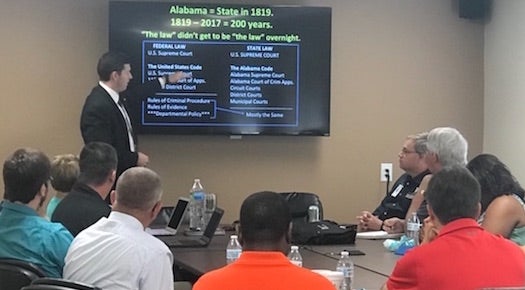CCS admins learn how to interact with SSOs/SROs
Published 8:56 pm Friday, August 24, 2018

- Chief Deputy District Attorney C.J. Robinson with the 19th Judicial Circuit held a class for Chilton County Schools administrators on Aug. 23 to go over the legalities of how to interact with the School Security and Resource Officers working in the county. (CONTRIBUTED)
By J.R. Tidwell / Editor
Administrators with Chilton County Schools attended a class on Aug. 23 that sought to help them understand their rights and how to interact with School Security and Resource Officers when it comes to the searching of students and their property in order to seize any illicit materials.
SSOs and SROs share many of the same responsibilities when it comes to school security, but School Resource Officers have some additional tasks.
Chief Deputy District Attorney C.J. Robinson contacted each of the superintendents in the counties that he covers and offered to host a class for the principals and other administrators in each system on the subject.
Robinson said CCS Superintendent Jason Griffin was the first person to respond and ask for the class to be held. Griffin told Robinson he wanted to make sure CCS was in compliance with all laws.
Robinson covered what Alabama law has to say regarding the rights of principals and what they are allowed to do if there is “reasonable suspicion” that a student is in possession of any banned or illegal materials.
“Since the Board of Education recently decided to have people (SSOs and SROs) in each school, I am trying to educate them on how to interact with the officers,” he said. “This is the first time in two years I have held a class like this.”
According to CCS Safe Schools Coordinator Mickey Hardwick, the biggest thing addressed by the class was how far principals can take a search and questioning of a student when reasonable suspicion exists that they are in possession of illicit materials, such as drugs, and any lines not to cross that should be left to law enforcement such as the SSOs and SROs.
“It helps administrators know that they are still in charge of the school and know what they can and can’t do,” Hardwick said. “It reaffirmed what a lot of them already knew. At the end of the day, our goal is to ensure the safety of every student, faculty member and parent in the county.”
For example, if a principal has reasonable suspicion that a student has something they are not supposed to have at school in a backpack or locker, administrators are allowed to search those items whether or not a member of law enforcement is present.
Hardwick said the class also touched on whether or not students were aware of what rights they had during a search or questioning.






